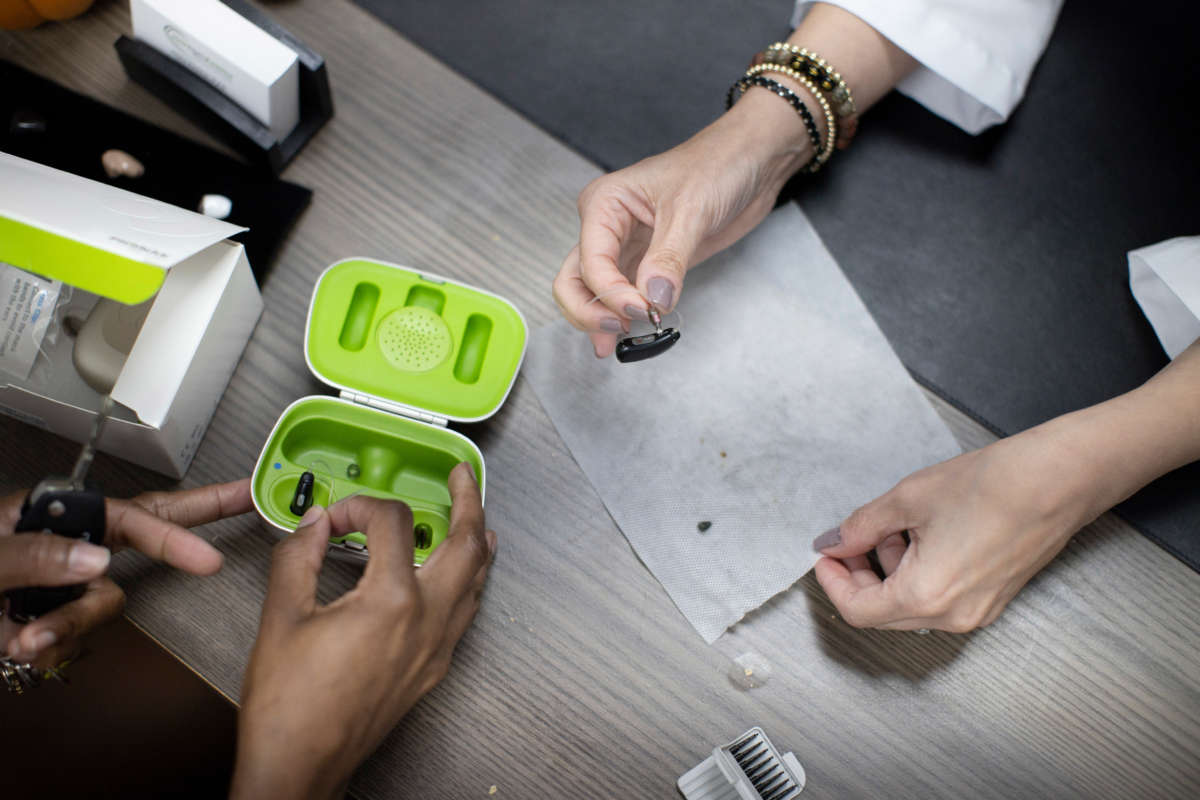Truthout is a vital news source and a living history of political struggle. If you think our work is valuable, support us with a donation of any size.
Millions of Americans who need hearing aids will be able to purchase them over the counter as soon as this fall under a new Food and Drug Administration (FDA) rule that will likely also lower costs, the Biden administration has announced.
The FDA finalized a rule on Tuesday that would create a new over-the-counter category for hearing aids, which the agency says will largely benefit those who experience mild to moderate hearing impairment. As soon as mid-October, those with hearing loss will be able to purchase aids online or in-store without a prescription or an appointment with a medical professional.
This will make it far easier for people to access hearing aids while also lowering their cost, according to the administration. Costs of hearing aids are often a large barrier to access; hearing aids can cost between $2,000 and $7,000 a pair, with an average of around $4,600. These costs are not covered by Medicare and are often not covered by private health insurance plans. The new rule, which has been praised by public health professionals, could reduce costs by as much as $3,000, President Joe Biden says.
The rule came as a result of an executive order signed by Biden last July, directing the Department of Health and Human Services (HHS), which oversees the FDA, to release new guidance on allowing hearing aids to be sold over the counter to increase access and competition across the pharmaceutical and medical equipment industry.
Research cited by the FDA finds that nearly 30 million Americans benefit from using hearing aids or could benefit given the opportunity. People who experience hearing loss say that they frequently feel depressed, anxious or isolated because of the condition and that going to an audiologist to have hearing aids prescribed is a time-consuming and often expensive process.
But hearing aids are still inaccessible to many people. Only about 1 in 5 people who could benefit from hearing aids use one.
“For millions of Americans, hearing aids and the doctor’s visit to get them prescribed are too expensive,” Biden said in a statement. “This action makes good on my commitment to lower costs for American families, delivering nearly $3,000 in savings to American families for a pair of hearing aids and giving people more choices to improve their health and wellbeing.”
Biden also emphasized that the new ruling will increase competition in the market. Currently, five large hearing aid manufacturers dominate about 90 percent of the market.
HHS Secretary Xavier Becerra said that the rule is a “significant milestone” in making hearing aids more accessible. “Reducing health care costs in America has been a priority of mine since Day One and this rule is expected to help us achieve quality, affordable health care access for millions of Americans in need,” Becerra said.
Progressive lawmakers have also praised the rule. “Even mild hearing loss among older people can increase social isolation and, studies show, double dementia risk,” wrote the Congressional Progressive Caucus on Twitter. “This is such an important move that will change lives.”
People with severe hearing loss or who are under 18 will still have to obtain hearing aids through a prescription.
Despite established links between hearing loss and depression, dementia, and more, many people with hearing loss don’t purchase hearing aids, a recent poll found. This is in part due to cost and stigma, but also because hearing health is poorly understood.
These deficiencies may be linked to the fact that Medicare doesn’t cover hearing, forcing people to seek out care out of pocket or through private insurance, which many can’t afford.
As a result, some progressive advocates have called for Medicare and Medicaid expansion to ensure that seniors and other populations with Medicare, like those with disabilities, can access hearing care. Advocates for those with hearing loss have emphasized that, though the rule expands access for many people, some people with hearing loss still need consultation with an audiologist in order to fully understand the condition and get fitted for a hearing aid.
Meanwhile, according to a report released in June by Senators Elizabeth Warren (D-Washington) and Chuck Grassley (R-Iowa), hearing aid makers had waged a fierce campaign to lobby the FDA against the rule. They sent hundreds of what appeared to be form letters to lawmakers and submitted hundreds of comments during the rule’s public comment period, amounting to nearly 40 percent of all publicly available comments on the rule.
A terrifying moment. We appeal for your support.
In the last weeks, we have witnessed an authoritarian assault on communities in Minnesota and across the nation.
The need for truthful, grassroots reporting is urgent at this cataclysmic historical moment. Yet, Trump-aligned billionaires and other allies have taken over many legacy media outlets — the culmination of a decades-long campaign to place control of the narrative into the hands of the political right.
We refuse to let Trump’s blatant propaganda machine go unchecked. Untethered to corporate ownership or advertisers, Truthout remains fearless in our reporting and our determination to use journalism as a tool for justice.
But we need your help just to fund our basic expenses. Over 80 percent of Truthout’s funding comes from small individual donations from our community of readers, and over a third of our total budget is supported by recurring monthly donors.
Truthout has launched a fundraiser, and we have a goal to add 242 new monthly donors in the next 48 hours. Whether you can make a small monthly donation or a larger one-time gift, Truthout only works with your support.
